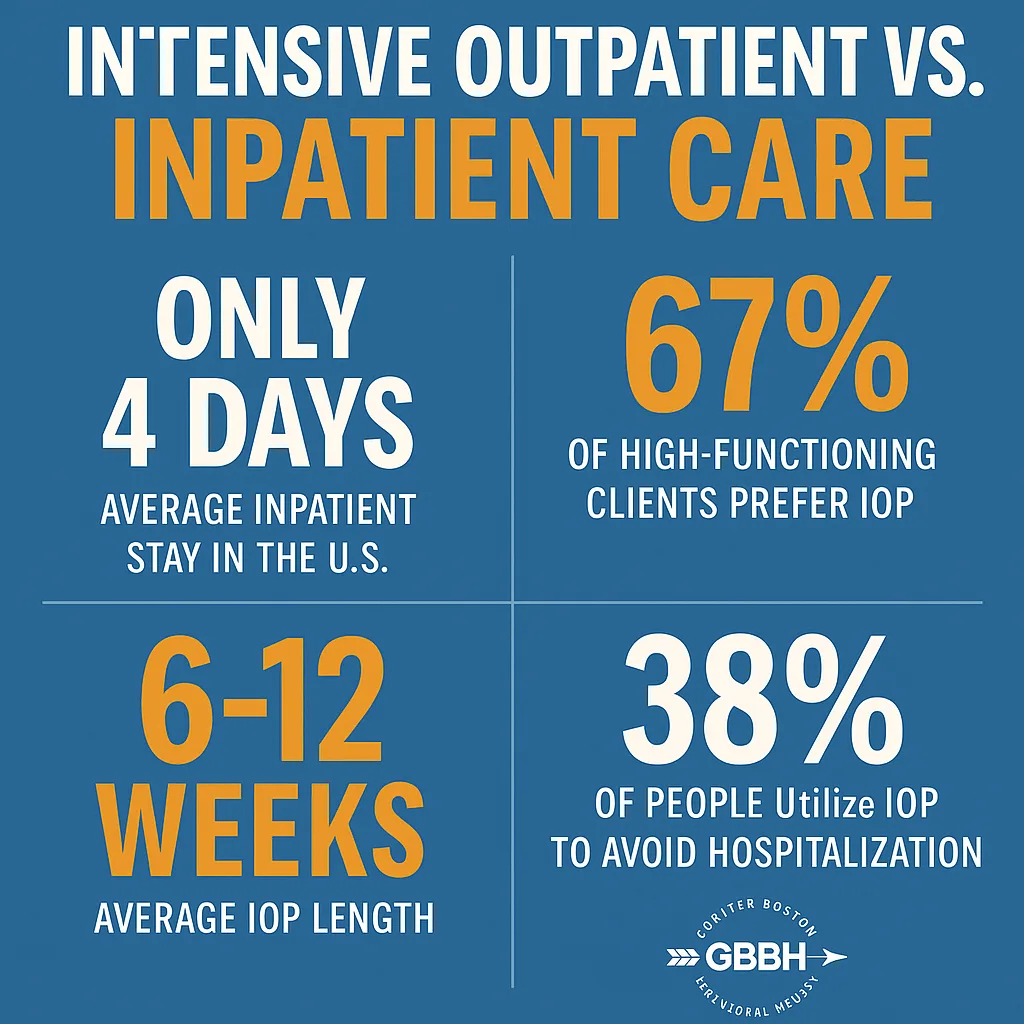From the outside, I was a success story. Productive, responsible, social—everything looked normal. But inside, it was a slow burn. Every morning was harder than the last. Every night came with a drink to “unwind” that turned into several. I wasn’t in crisis, but I was heading there. What I didn’t know until I called Greater Boston Behavioral Health was that I didn’t need to choose between burning out or disappearing into rehab. There was an option that met me where I was: their intensive outpatient program.
High-Functioning Doesn’t Mean Healthy
For a long time, I used my responsibilities as proof I didn’t have a problem. I showed up for meetings, hit deadlines, made it to my kid’s soccer games. I wasn’t living under a bridge, so I couldn’t be “that bad,” right?
Wrong.
What I was really doing was barely keeping my head above water. Every week felt like a marathon with no finish line. I spent more energy hiding my drinking than enjoying anything in my life. That’s what high-functioning addiction looks like: showing up on the outside while quietly unraveling on the inside.
At some point, I had to ask myself—what’s the point of keeping it together if I’m miserable the whole time?
Intensive Outpatient Programs: The Option I Didn’t Know I Had
When I finally admitted I needed help, my biggest fear was disappearing from my life. I thought treatment meant quitting my job, checking into inpatient care, and explaining everything to everyone. That fear almost kept me from making the call.
Greater Boston Behavioral Health changed that.
With their intensive outpatient program in Boston, MA, I could get serious support without pressing pause on everything else. IOP isn’t just a watered-down version of rehab. It’s structured therapy and real accountability—wrapped in a schedule that respects your life. I went in during the day, got real work done on myself, and still made it home for dinner. It was everything I didn’t know I was allowed to ask for.
Real Therapy, Real Conversations—Not Just “Checking the Box”
One thing that surprised me? The depth of therapy in IOP. I worried it might feel like a quick fix or a checkbox exercise. Instead, it was the opposite.
Group sessions helped me hear my own thoughts out loud. Individual counseling got me honest about things I’d been avoiding for years—stress, perfectionism, the quiet shame of keeping secrets. The program also included practical tools: stress management, emotional regulation, relapse prevention skills.
It wasn’t about survival anymore. It was about building a life I didn’t need to escape from.
Balancing Recovery with Responsibility
One of the biggest advantages of IOP was learning how to navigate real-life triggers while getting treatment. Inpatient removes you from life—but life is waiting when you get out.
With outpatient care, I was able to practice coping skills in real time. Stressful morning? I had therapy that afternoon. Tough work meeting? I processed it in group the next day. I wasn’t learning in a bubble; I was learning in my actual life, and that made the lessons stick.
Keeping My Privacy Without Sacrificing Support
Boston can feel like a small town, especially in professional circles. I’ll be honest, I worried about privacy. Would I run into a coworker? Would I feel exposed?
Greater Boston Behavioral Health handled this with care. Groups were intimate, staff were professional and discreet, and sessions were held in a way that respected confidentiality. It wasn’t just about privacy—it was about dignity. I got to feel human, not like a walking problem.
Choosing IOP Helped Me Stay Ahead of the Crash
We’re taught to wait for rock bottom, but you don’t have to crash to change. IOP gave me a way out before everything fell apart. I didn’t have to wait for a DUI, a divorce, or a breakdown. I could start healing before I lost the things I cared about.
If you’re like I was—managing on the surface, struggling underneath—you don’t have to wait for disaster to make a change. Outpatient treatment offers a way to reclaim yourself without losing your place in life.
Who Should Consider an Intensive Outpatient Program?
You might be a good fit for IOP if:
- You’re experiencing increased stress, anxiety, or substance use but can maintain daily responsibilities.
- You want to address mental health or substance use without stepping away from work or family.
- You feel stuck in a cycle of stress and coping behaviors that no longer serve you.
- You need structured support but not 24/7 supervision.
- You want to prevent things from getting worse instead of waiting for a crisis.
If any of this sounds familiar, our intensive outpatient program in Boston can help you step in before things fall apart. If you’re near Boston, Dedham, Waltham, Needham Massachusetts, GBBH offers programs with that same approach.
Frequently Asked Questions About Intensive Outpatient Programs
What is an intensive outpatient program (IOP)?
An intensive outpatient program (IOP) offers structured therapy several days a week, usually in three-hour blocks, while allowing you to continue working, caring for family, and living at home. It’s ideal for those who need more support than weekly therapy but don’t require inpatient care.
How long do IOP programs last?
At Greater Boston Behavioral Health, most IOP programs run for 6 to 12 weeks, depending on individual needs. You’ll typically attend sessions three to five days per week.
Is IOP private?
Yes. Confidentiality is a core part of treatment. Group sessions are respectful spaces, and staff are trained to protect your privacy. You won’t be put in a situation where your personal or professional life is compromised.
Can I work while attending IOP?
Absolutely. That’s the point. IOP is designed for people who want to balance treatment with work and life commitments. Many sessions are scheduled in ways that accommodate professional hours.
Will insurance cover IOP?
Most major insurance providers cover intensive outpatient programs. Greater Boston Behavioral Health accepts many insurance plans and can help you verify your benefits quickly. You can learn more about program options and coverage here.
Don’t Wait for Everything to Fall Apart
You don’t need to hit rock bottom to take back control. You can get help before things spiral, without walking away from your life. IOP gave me my life back—balanced, clear-headed, and present.
Call (888) 450-3097 or visit Greater Boston Behavioral Health’s intensive outpatient program to see how you can find real support right here in Boston, on your terms.


